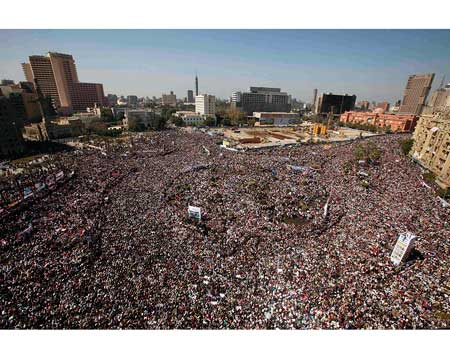
Aiming to explain Mideastern anger in a way that outsiders can understand, much the Western media presented the Egyptian protests as secular in nature and led by younsters motivated solely by "rising prices and stagnant incomes, and greater freedom against police brutality" - universal wrongs that people around the world can relate to.
But others see these revolutions, including Egypt's, quite differently.
The Syrian president’s political media advisor, Dr. Bouthaina Shaban, recently wrote in Middle East Monitor that "American politicians should realize that these revolutions are against Western support of despotism, occupation, corruption and submission to foreign dictates. The West will again be surprised at the will, determination and ability of the Arab people to change their future...."
The Western world and its policymakers tend to overlook the roles that national pride and identity play in Middle East events. Post-identity thinkers including leaders, advisors, analysts and many media commentators, completely disregard the role of identity and religion in most conflicts. Consequently, much of the secular Western world often misunderstands Mideast tensions.
Democracy is the buzz word for those wearing post-identity glasses. "Arab youth want democracy, not theocracy," wrote recently John Esposito, a professor of Religion and International Affairs and director of Prince Alwaleed Bin Talal center for Muslim-Christian understanding at Georgetown University for CNN last week. American academics and media commentators presented heart-warming scenarios of democracy bringing freedom to the Levant. But is the Western idea of democracy what the Middle East masses, imbued in a completely different cultural mindset, actually have in mind?
Common sense would dictate otherwise. A Pew poll released on December 2, 2010 found that 85% of Muslims in Egypt welcome Islamic influence over political life and view it as a positive thing for their country. The majority of Egyptians support segregating men and women in work places across the country (54%) and instituting harsh punishments for stealing in the form of hand amputations or whippings. About 82% of Egyptians also endorse the stoning of people who commit adultery. The majority of Egyptians also support the death penalty for those who leave the Muslim religion.
‘Christians destined for hell’
Much has also been done to modify the image of the Egyptian Muslim Brotherhood in order to make the movement more “acceptable” to Western audiences. Terms like "moderate" and "normal" have been used to explain the Brotherhood's goals. The BBC describes the organization as "conservative and non-violent," while President Barack Obama's Intelligence Chief, James Clapper, said the group was "largely secular...one that has eschewed violence and decried al-Qaeda."
However, a sermon delivered by the Muslim Brotherhood's Supreme Guide Mohammad Badie in September 2010 had very radical tones. In a transcript translated by Memri from Arabic, the recently appointed Brotherhood leader stated "Muslims crucially need to understand that the improvement and change that the Muslim nation seeks can only be attained through jihad and sacrifice and by raising a jihadi generation that pursue death." Badie also proclaimed that the US "does not champion moral and human values" and is now heading towards its demise.
Careful perusal of the official Egyptian Muslim Brotherhood website, both in English and Arabic, reveals other elements about this organization. Among the many articles highlighting the moderate aspects (in English), there is a panegyric commemorating one of the movement's major thinkers, Sayyid Qutb. A leading Egyptian theologian, Qutb was born and raised in Egypt and later spent time in America in the 1940s studying educational administration at Colorado State College in Greely and later working at Stanford University.
Qutb's visit to America left him disgusted with Western life. He described America as devoid of any spiritual or moral values, promoting only what was primitive and animalistic. Qutb published an article upon his return to Egypt called, America I Have Seen, where he strongly criticized America's materialism, individual freedoms, economic system, racism, superficiality, and sexual mores.
Among other things, Qutb argued that anything non-Islamic was evil and corrupt and that Sharia freed both the society and the individual. From Qutb's reading of the Koran, he deduced that the Christians are all destined for hell and in later works he preached against Christians, Jews and the Western way of life. Qutb, who was noted to have inspired al-Qaeda leader Osama bin Laden, continues to leave a lasting mark on Muslim Brotherhood members today and the Muslim world in general.
At the end of the day, most of the Middle East, including Egypt, will continue to view the West through the perspective of Sayyid Qutb. The Egyptian protestors who screamed "We hate America" at ABC News correspondent Christiane Amanpour and those who attacked CNN reporter Anderson Cooper did so not because of normalized, moderate views of America. The time has come to take the rose-tinted glasses off and realize that two cultural mindsets will inevitably clash no matter what attempts are made to gloss over the Mideast reality with Western verbiage.
Anav Silverman is the international correspondent at Sderot Media Center: www.SderotMedia.com and works as an educator in Jerusalem.
- Follow Ynetnews on Facebook















